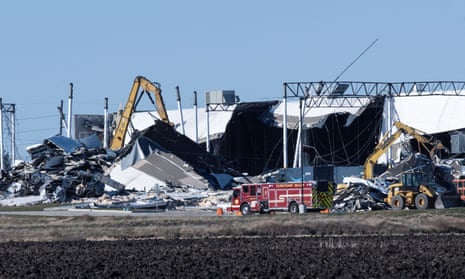Why did eight workers at a Kentucky candle factory and six workers at an Illinois Amazon warehouse die this week? They were killed when a powerful tornado destroyed their workplaces, but it wasn’t really the storm that killed them, any more than a sailor forced to walk the plank is killed only by the waves. They were not random victims. They were sacrificed. We here in the most advanced nation on earth offered them up to the gods that we actually worship.
Why did they die? They died because they were inside their workplaces in the path of the storm. They died because they did not leave work before disaster struck. And they did not leave work because they were allegedly ordered not to, by their bosses. The factory workers in Kentucky say that managers threatened to fire them if they left. Amazon workers say that they were told not to leave in advance of the storm. They also say that lack of adequate safety procedures is par for the course at Amazon, where the employee handbook notifies workers that they can be fired for leaving without “permission”.
Why couldn’t they leave work? Because none of them had a union to protect them. None of them had a union to empower them to stand up to a boss who demanded that they do something that put them in danger. None of them had a union to give them the collective ability to require their employers to value their lives. Unions are the only – the only – reason industries from construction to coal mining are far safer today than they were a century ago.
Unions have fought for generations to force – to force – companies to take safety seriously. Under capitalism, a dead worker is nothing more than a small debit on a company’s ledger. Companies do not allow worker safety to impinge on their all-important profits unless they are absolutely required to. Unions are the things that require them to. The workers who died this week had no unions. They had inadequate protections at work. And now they are gone.
Why didn’t they have unions? They didn’t have unions because employers believe that unions will cost them money, and therefore all of corporate America and much of our political structure has conspired for many decades to make it extremely hard for regular working people to form and maintain unions. Amazon, in particular, goes to great lengths to fight unionization everywhere. It spies on workers; it hires expensive anti-union consultants; it violates labor law; it lies to its workers and tries to scare them.
It does this because it knows that unions might eventually require Amazon to treat its workers as employees, and as humans, rather than as automatons who exist to fill tiny interchangeable roles in Amazon’s logistical operations. A union might, for example, endanger Amazon’s two-day delivery process, by requiring a warehouse to momentarily shut down when a deadly tornado is approaching. That simply won’t do. It is vital that Amazon remain union-free, so that its founder may continue to accumulate a vast and unspendable fortune that he will use to build rocket ships for his own personal amusement. That is the highest purpose of this wondrous corporation, and nothing must interfere with that.
And why is it that despite being treated as disposable machines, despite having their safety ignored and their right to organize crushed and their basic human identity discarded, people still take jobs like these? Why did these workers stay at work when their manager told them to, rather than listening to the alarms going off in their own heads? Because they need to, in order to survive.
This is the American system as we like it. As a society, we prefer a world in which a large number of people live paycheck-to-paycheck and will therefore take jobs as “independent contractors” with few rights and little safety and no union and low wages. We want a world in which people are so afraid of losing their jobs that they will quite literally ride out a tornado for less than $20 an hour, because the alternative is poverty. This is the social arrangement that allows us to have lots of cheap stuff, fast.
So many of our most respected citizens can claim responsibility for this achievement: every corporate executive who hires an anti-union law firm; every politician who passes “right to work” laws and opposes public health care; everybody who votes Republican because of some weird race panic; every member of the Chamber of Commerce who conspires with local leaders to give tax breaks to companies like Amazon to build a vast warehouse in their dreary county; every institutional investor who demands constant growth and utmost efficiency and never, ever peeks behind the curtain to see how it is accomplished; and every one of us who has fallen in love with the seductive ability to click and receive an infinite assortment of consumer goods, whenever and wherever we want.
What would it take to avoid a tragedy like this? Perhaps three-day delivery, instead of two. A few bucks more for those bluetooth headphones. A few percentage points lower corporate profits, a few points higher taxes. A few people at the company to take safety seriously, and a few more to deal with the union respectfully. That’s all, really. It doesn’t sound like much. But we have clearly judged it to be a price too high to pay. We choose instead to pay with the lives of working people, and cling fervently, like deluded gamblers, to the belief that we will always be the lucky ones.
Hamilton Nolan is a labor reporter at In These Times
